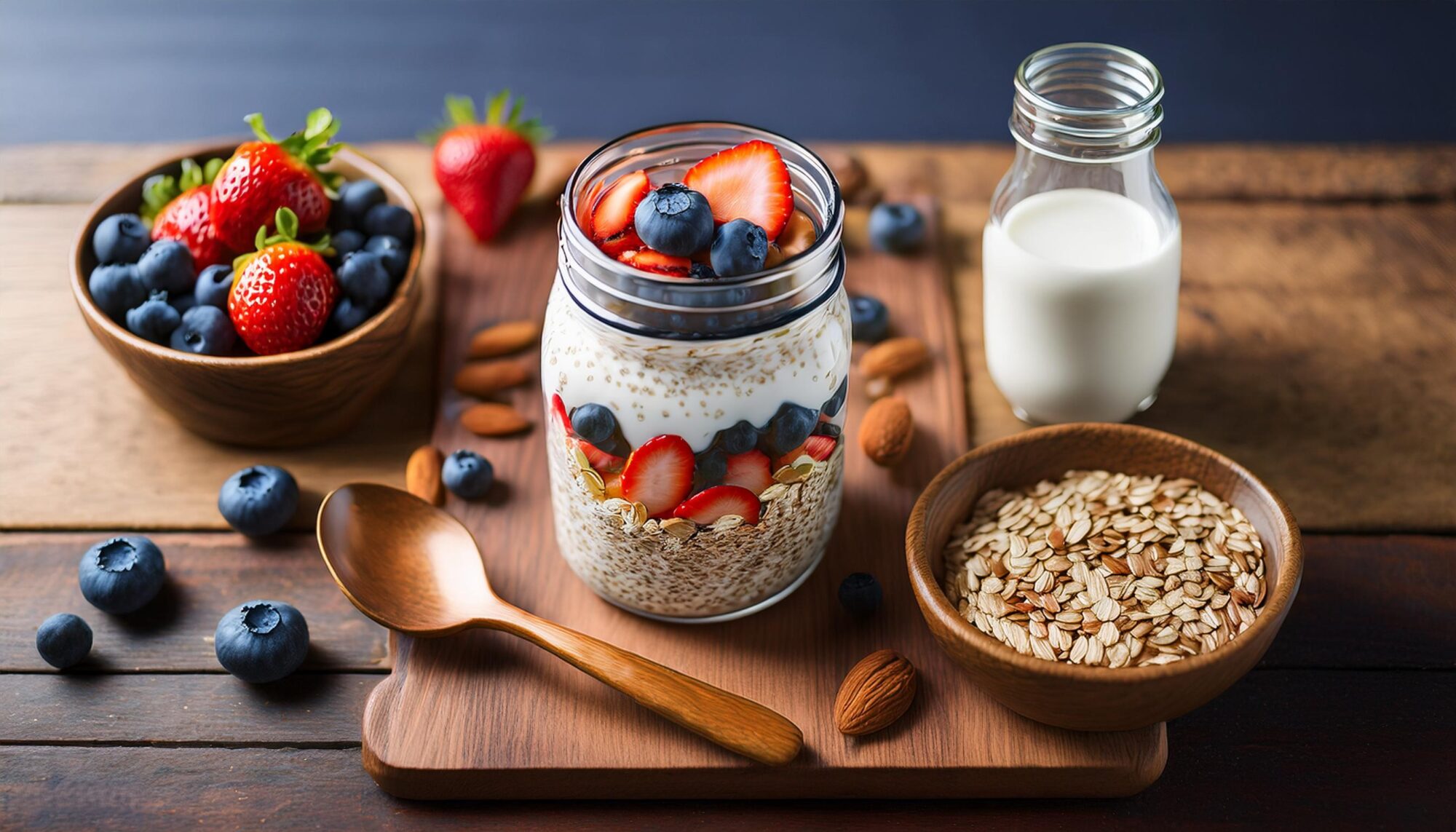Did you know that overnight oats have become one of the go-to breakfasts for millions of people worldwide? Yep, they’re not just a passing trend; they’re here to stay, and with good reason! Whether you’re a morning person or not, this quick and easy breakfast will fuel your day with the right balance of nutrients. It’s the perfect blend of health and convenience something that’s hard to find in today’s hectic world.
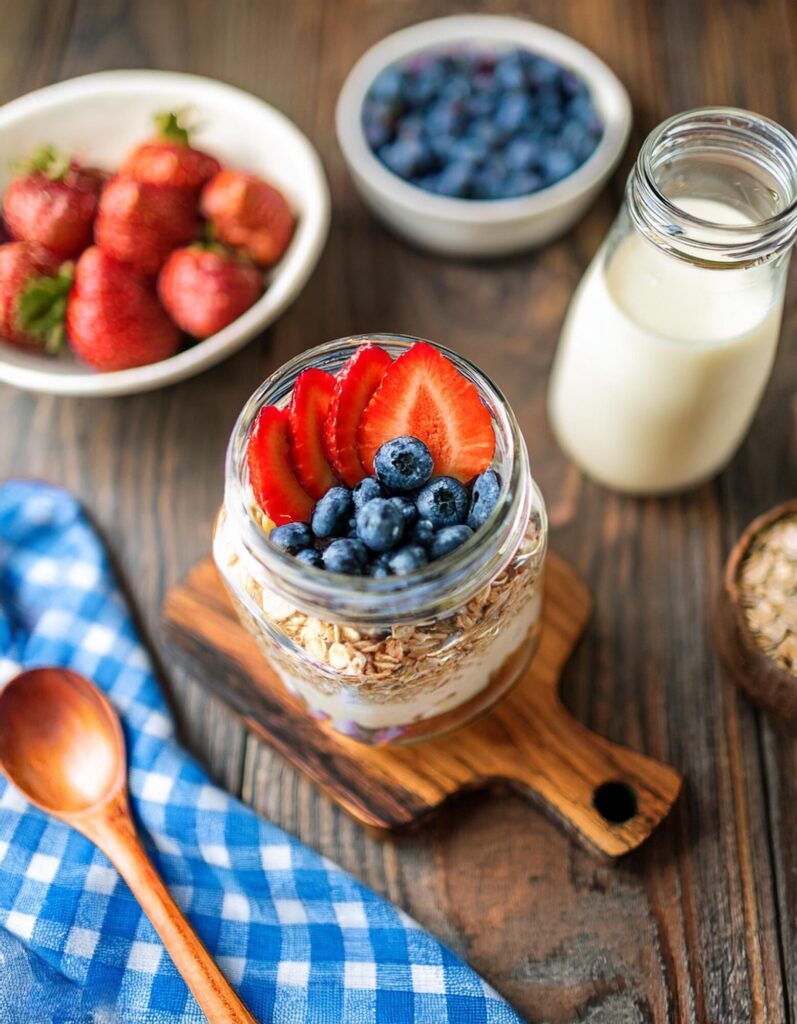
I’ve been there myself staring at the fridge early in the morning, trying to figure out what to eat that’s both healthy and fast. That’s when overnight oats came into my life. With just a little prep the night before, you’ve got a hearty, delicious meal waiting for you in the morning. No more skipping breakfast or reaching for sugary cereal. But the real question is: Are overnight oats as healthy as people say? Let’s dive in!
Are Overnight Oats Actually Healthy?
You bet they are! Oats are loaded with fiber, specifically beta-glucan, which is known to help reduce cholesterol levels. Fiber is like that silent partner in a good relationship it does all the behind-the-scenes work to keep your gut happy and digestion smooth. And let’s not forget the protein! Oats pack a decent protein punch, which is great if you’re looking to keep yourself full longer.
Now, I’ve personally found that adding a bit of Coconut Yogurt or chia seeds to my overnight oats helps up the protein game even more. Those little chia seeds might seem insignificant, but don’t underestimate them they’re packed with omega-3 fatty acids, which are great for heart health. Plus, they give the oats a nice texture that keeps things interesting.
One of the coolest things about overnight oats is how customizable they are. Want to go all-in on the antioxidants? Toss in some blueberries or strawberries. Need a little extra energy for a morning workout? A spoonful of almond butter or a handful of nuts will do the trick. Seriously, the possibilities are endless! Just make sure you’re not going overboard on the sugary toppings, which leads me to…
What Not to Add in Overnight Oats
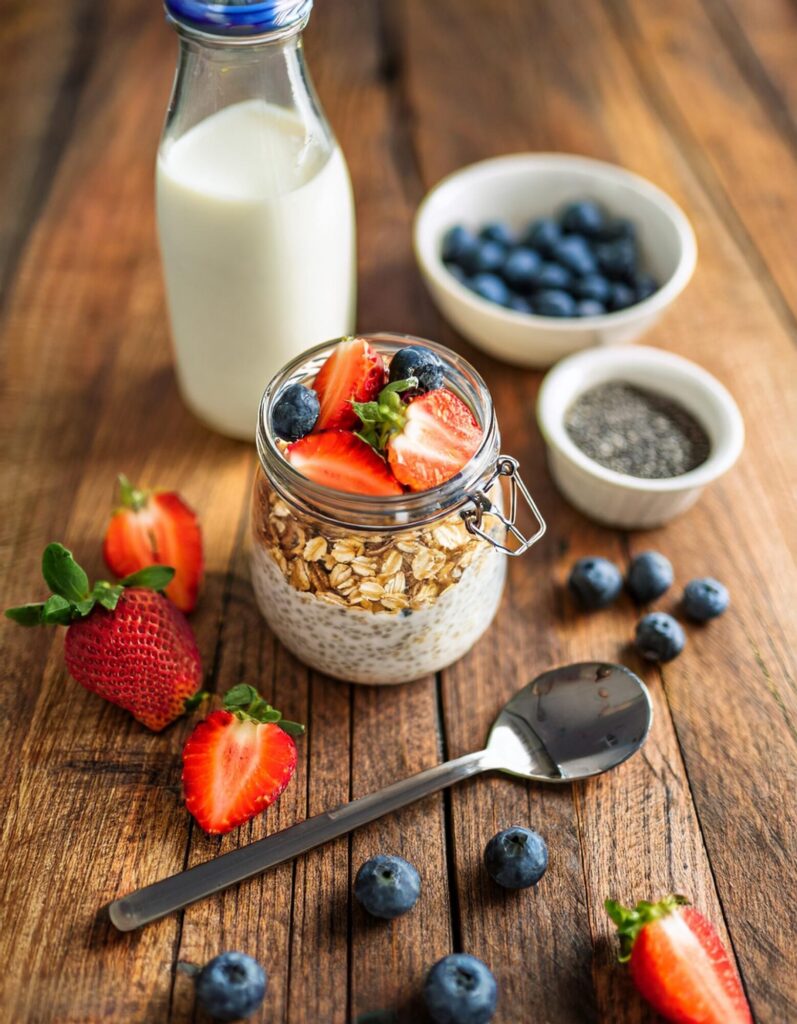
Here’s where I’ve messed up in the past: adding too much sugar. I thought, “A little honey here, some chocolate chips there… what could go wrong?” Turns out, a lot. Oats are naturally mild, and if you drown them in sugar, you miss out on that balanced, slightly nutty flavor. Worse, too much sugar can undo all the health benefits.
So what should you avoid?
- Sugary syrups: Maple syrup and honey are okay in moderation, but steer clear of the highly processed stuff.
- Flavored yogurts: I’ve made the mistake of using flavored yogurt, thinking it would add more flavor. Instead, it just added unnecessary sugars. Stick with plain Coconut Yogurt for protein without the sugar bomb.
- Too many nuts: While nuts are healthy, they can make the oats gritty if you add too many. A small handful goes a long way.
What I’ve learned? Less is more. A sprinkle of cinnamon or a dash of vanilla extract can go a long way in boosting flavor without adding sugar.
What Is the Secret to Perfect Overnight Oats?
If I had to name one secret to getting overnight oats just right, it would be all about nailing the oats-to-liquid ratio. When I first started making them, I didn’t pay attention to this, and boy, did I regret it! I had oats that were too soupy or, even worse, so dry they felt like chewing rubber. Trust me, after many experiments, I’ve found that the perfect ratio is 1 part oats to 1.5 or 2 parts liquid.
A little trick I learned is to always stir the oats before soaking. I didn’t do this at first, and I ended up with these dry pockets of oats stuck at the bottom, while the top layer was swimming in milk. Giving them a good mix ensures that all the oats get properly soaked.
One of my biggest mistakes, though, was trying to rush the process. Let them soak for at least 6 hours! Anything less, and they just don’t have the right texture. I remember one night when I completely forgot to prep my oats ahead of time. The next morning, I panicked and tried to eat them after just 4 hours. Yikes. They were hard and chewy, and not in a good way. From then on, I make sure to prep them the night before no shortcuts.
Finally, if you’re after that perfect creamy texture, use a combination of rolled oats and chia seeds. I’m a big fan of how the chia seeds expand overnight and give the oats a pudding-like consistency. It’s so satisfying! Just make sure not to overdo it about a teaspoon per serving is enough.
How Are Overnight Oats Different From Oatmeal?
It’s easy to lump overnight oats and oatmeal into the same category they’re both made from oats, after all but they’re completely different in taste, texture, and preparation. The main difference? Overnight oats aren’t cooked.
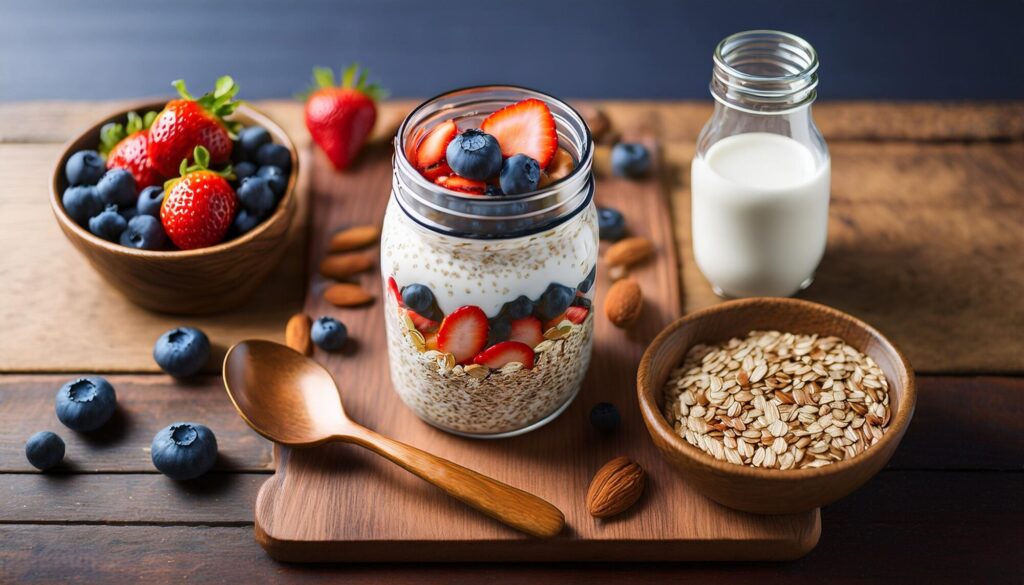
Oatmeal, whether it’s steel-cut or rolled oats, involves boiling or simmering the oats until soft. This heating process breaks down the starches, giving oatmeal its classic creamy texture. Overnight oats, on the other hand, are soaked in liquid overnight, which allows the oats to absorb the moisture without heat. What you end up with is a much firmer, almost chewy texture. Personally, I love this because it feels more like I’m eating something substantial, not just mush.
Now, here’s where overnight oats shine they’re a time-saver! I used to spend my mornings making oatmeal, standing over the stove while it cooked. And let’s be real, when you’re rushing to get out the door, that’s just not practical. But with overnight oats, the work is already done by the time you wake up! I can’t tell you how much easier my mornings became once I made the switch. Plus, the cold version is super refreshing, especially during the warmer months.
Nutritionally, overnight oats retain more nutrients since they aren’t heated. Cooking can break down some of the nutrients, especially vitamins, which means you’re getting the full benefits of the oats and any add-ins like fruit or chia seeds.
What Happens if I Eat Overnight Oats Every Day?
Here’s the thing: I’ve been eating overnight oats almost every day for months, and I’ve noticed some pretty awesome changes. First off, my digestion improved big time. The high fiber content in oats helps keep everything moving smoothly (if you know what I mean). I used to have digestive issues bloating, irregularity but incorporating oats regularly has definitely helped.
But it’s not just about fiber. Oats are loaded with complex carbs, which means they provide long-lasting energy. Since I started eating them every morning, I don’t feel that mid-morning slump as much. My energy levels are more consistent throughout the day, and I’ve even noticed that I stay full longer compared to other breakfasts I used to eat.
That said, eating the same thing every day can get boring, and I’ve hit that wall a few times. When I start to get tired of the same old mix, I like to switch things up by adding different fruits, nuts, or even spices like cinnamon or nutmeg. One of my favorites? Apple pie-inspired oats chopped apples, cinnamon, and a bit of honey. It’s like dessert for breakfast!
There’s also a downside to eating them every day, though. I realized I was missing out on other nutrients from different breakfast options. So, while overnight oats are amazing, I do make a point to mix things up occasionally with smoothies, eggs, or yogurt bowls, just to get a wider range of nutrients.
What Is the Best Liquid for Overnight Oats?
Ah, the great liquid debate. You might be wondering whether to use water, milk, or something else entirely for your overnight oats. Well, I’ve tried them all, and here’s what I’ve learned: The best liquid depends on your taste preferences and dietary goals.
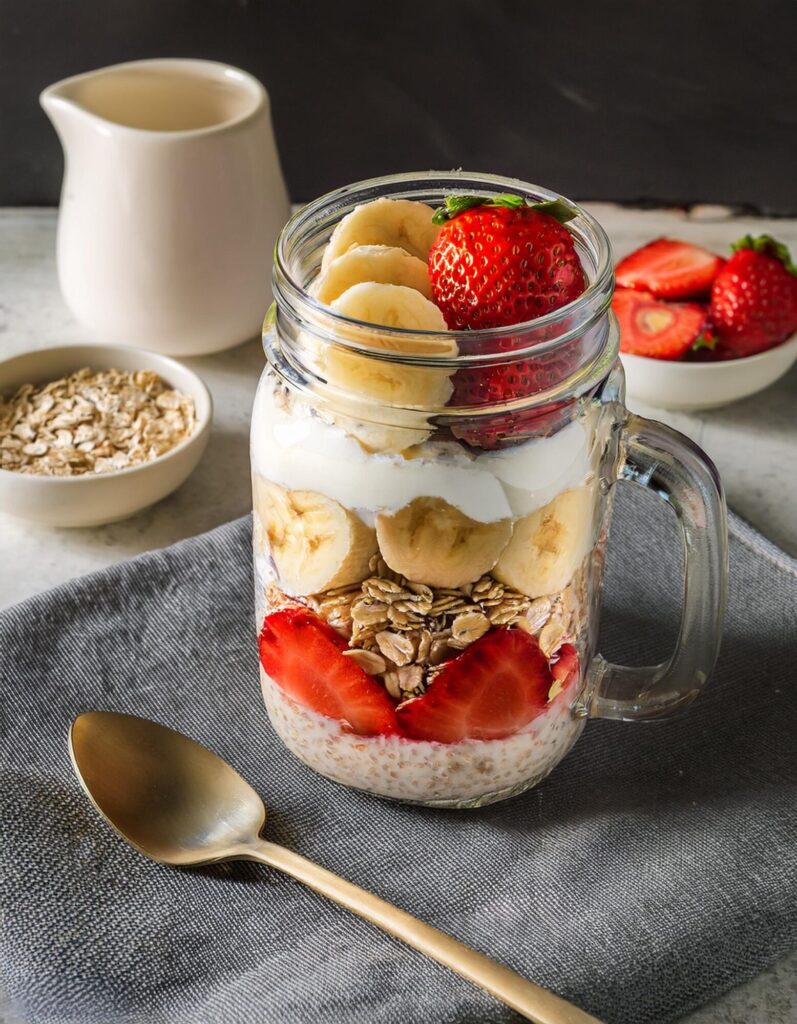
- Water: If you’re really watching your calorie intake or looking to keep things super simple, water works. But, in my opinion, water makes the oats kind of bland. They don’t have that creamy consistency that I love.
- Almond Milk: This is my favorite plant-based option. It’s lower in calories than cow’s milk and still gives the oats a nice, rich texture. I used to drink almond milk all the time, and once I switched to using it in my oats, it was a game-changer. Pro tip: Use unsweetened almond milk to keep the sugar low.
- Oat Milk: I mean, oats in oat milk? That’s kind of meta, right? Oat milk is a newer option I’ve started using, and it’s great if you want a slightly thicker texture. It’s naturally sweet, so it pairs well with the oats, but it can make the dish a little too rich if you’re not careful.
- Coconut Milk: If you want to get fancy and add a tropical twist, coconut milk is the way to go. But be aware that it’s much higher in fat, and it’s got a distinct flavor. I reserve coconut milk for when I’m craving something different, like a tropical-flavored overnight oats with pineapple and shredded coconut.
Ultimately, it’s all about balance. I usually go with unsweetened almond milk for a lighter option, but if I want a really creamy texture, I’ll mix it with a little cow’s milk.
What Is the Best Milk to Use for Overnight Oats?
When it comes to picking the right milk, it can feel like a lot of pressure. But after testing out all the options (believe me, I’ve tried them all), I’ve found that unsweetened almond milk hits the sweet spot for me. It’s low in calories, doesn’t overpower the flavor of the oats, and has that perfect level of creaminess without being too rich.
If you’re aiming for a creamier, more filling option, I’d recommend whole milk or oat milk. These options pack a bit more heft, which I like on mornings when I know I need the extra fuel to get through a busy day. You might lose some calories here, but I think it’s worth it if you prefer a more satisfying texture.
For those on a dairy-free diet, soy milk is another solid option since it has a similar protein content to cow’s milk. I’ve noticed that soy milk gives the oats a nice, thick consistency that keeps you full for hours. Plus, it’s great for people who are lactose-intolerant or vegan.
Do You Eat Overnight Oats Cold?
This is one of the biggest questions people ask me: “Do you eat them cold?” The answer is yes at least most of the time. I wasn’t a fan of cold oats at first. I mean, breakfast should be warm and cozy, right? But after a few tries, I grew to love it. There’s something refreshing about the chilled oats, especially when paired with fresh fruit or a drizzle of honey. It’s like a cold breakfast pudding!
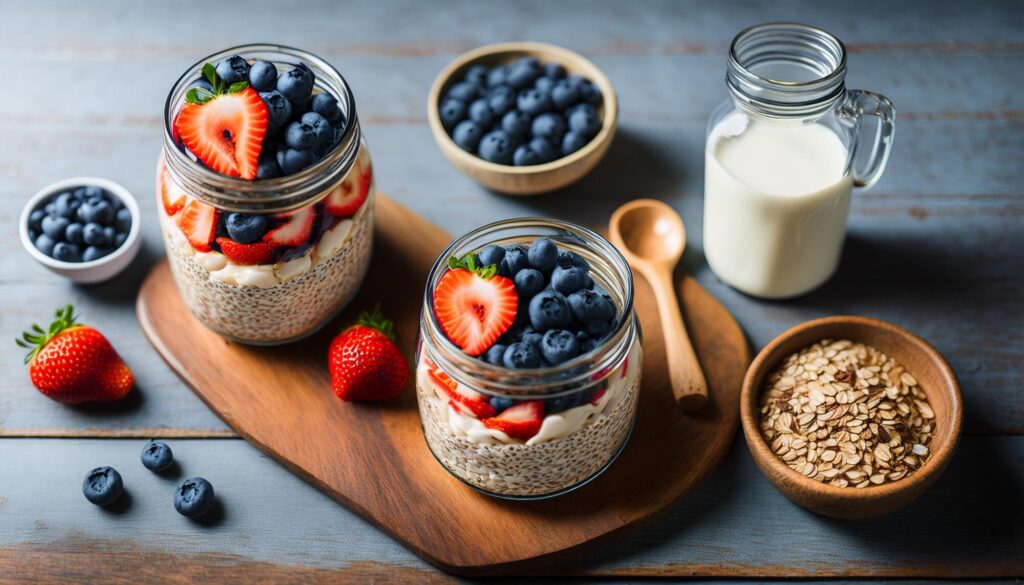
That said, if cold oats aren’t your jam, you can totally warm them up. Just pop them in the microwave for a minute or two. I did this a few times when I was transitioning from oatmeal to overnight oats, and it helped ease me into the idea. Now, I switch it up depending on the season cold in summer, warm in winter.
So there you have it a deep dive into the world of overnight oats! They’re easy, nutritious, and endlessly customizable, making them the perfect addition to your morning routine. Whether you’re soaking them in almond milk, tossing in chia seeds, or experimenting with new flavor combos, overnight oats can fit anyone’s lifestyle.
I encourage you to try them out, find what works best for you, and make the recipe your own! Have a favorite overnight oats recipe? I’d love to hear it drop your tips and tricks in the comments below!
Overnight Oats Recipe
Overnight Oats Variations
Here are a few fun and delicious ways to mix up your overnight oats recipe!
- Chocolate Peanut Butter
- Add: 1 tablespoon cocoa powder and 1 tablespoon peanut butter
- Top: With banana slices and a sprinkle of dark chocolate chips for a healthy twist on dessert
- Apple Pie Overnight Oats
- Add: 1 teaspoon cinnamon, 1 tablespoon chia seeds, and ½ cup diced apples
- Top: With chopped walnuts or pecans for a cozy, fall-inspired treat
- Berry Almond Crunch
- Add: ¼ cup mixed berries and 1 tablespoon almond butter
- Top: With sliced almonds and extra berries in the morning for a refreshing and crunchy option
- Tropical Overnight Oats
- Add: ½ cup coconut milk, ¼ cup diced pineapple, and 1 tablespoon shredded coconut
- Top: With extra coconut and a drizzle of honey or maple syrup for a tropical breakfast
Storage Tips
- Fridge: Overnight oats can be stored in the refrigerator for up to 4 days. The longer they sit, the softer the oats will become. I usually make a big batch on Sunday and eat them throughout the week.
- Freezer: Believe it or not, you can even freeze overnight oats! Store them in freezer-safe containers for up to 3 months. Just thaw in the fridge overnight before eating.
Why Overnight Oats Are a Great Breakfast Option
- Time-saving: Prepping breakfast the night before means no rushing around in the morning.
- Nutrient-packed: Oats are rich in fiber, which aids digestion and keeps you full longer. chia seeds add healthy fats and protein, making it a balanced meal.
- Customizable: You can adapt the recipe to fit your dietary needs gluten-free, dairy-free, vegan, or low-sugar.
- Portable: Grab the jar and go! It’s perfect for busy mornings, especially if you’re running out the door.
Health Benefits of Overnight Oats
- High in Fiber: Oats are a great source of soluble fiber, which helps lower cholesterol levels, keeps blood sugar in check, and improves digestion.
- Packed with Antioxidants: Adding fruits like blueberries or strawberries boosts the antioxidant content, which helps combat inflammation and supports overall health.
- Protein-Rich: Silken Tofu and chia seeds give this recipe a nice protein boost, which helps with muscle repair and keeps you feeling full throughout the day.
- Low in Sugar: By controlling the amount of sweetener you add, overnight oats can be much lower in sugar than store-bought cereals or granola bars.
Looking to boost your protein intake with more delicious options? Don’t stop at overnight oats—check out these must-try recipes! Whip up a Protein-Packed Smoothie Bowl, enjoy some Overnight Protein Oats, indulge in a Chia Seed Protein Pudding, or refresh yourself with a creamy Strawberry Protein Shake. Your taste buds and muscles will thank you!
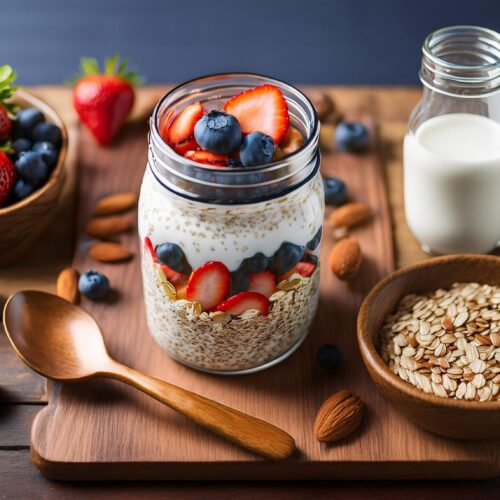
10 Surprising Facts About Overnight Oats That Make Them Healthier Than You Think
Ingredients
- 1/2 cup rolled oats old-fashioned oats, not instant
- 1/2 cup milk almond, oat, or soy milk depending on preference
- 1 tablespoon chia seeds for fiber, omega-3s, and a thicker texture
- 1 tablespoon honey or maple syrup optional, for sweetness
- 1/2 teaspoon vanilla extract optional, for flavor
- 1/4 cup fresh fruit blueberries, strawberries, banana slices, or your choice
- 1 tablespoon almond butter or peanut butter optional, for added protein and healthy fats
Instructions
- In a mason jar or small bowl, combine the oats, milk, chia seeds, honey, and vanilla extract. Stir well to ensure the oats are fully mixed with the liquid.
- Stir in any add-ins like almond butter, peanut butter, or fruit (or save the fruit for topping in the morning).
- Cover the jar or bowl with a lid or plastic wrap and refrigerate for 6-8 hours (overnight).
- In the morning, give the oats a good stir. You can top them with fresh fruit, nuts, seeds, or a drizzle of honey for extra sweetness.
- You can eat the oats cold straight from the fridge or warm them up by microwaving for 30-60 seconds if you prefer a warmer breakfast.
Notes
- Tips for Customization:
- Boost Protein: Add a scoop of protein powder to the mixture before refrigerating. This is great for those looking to up their protein intake for muscle repair or weight management.
- Lower the Sugar: Reduce or skip the honey/maple syrup if you want to lower sugar. You can add natural sweetness with fresh fruit like sliced bananas, berries, or apples instead.
- Increase Fiber: Adding extra chia seeds or flaxseeds can increase the fiber content, which is beneficial for digestion and gut health.
- Gluten-Free Option: Ensure the oats you’re using are labeled gluten-free, as oats are naturally gluten-free but may be processed in facilities with wheat.

